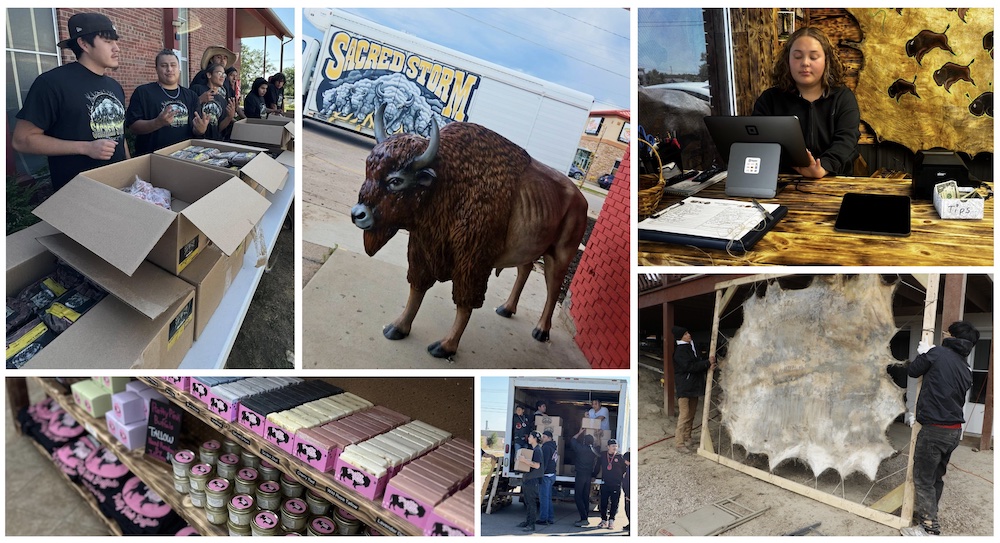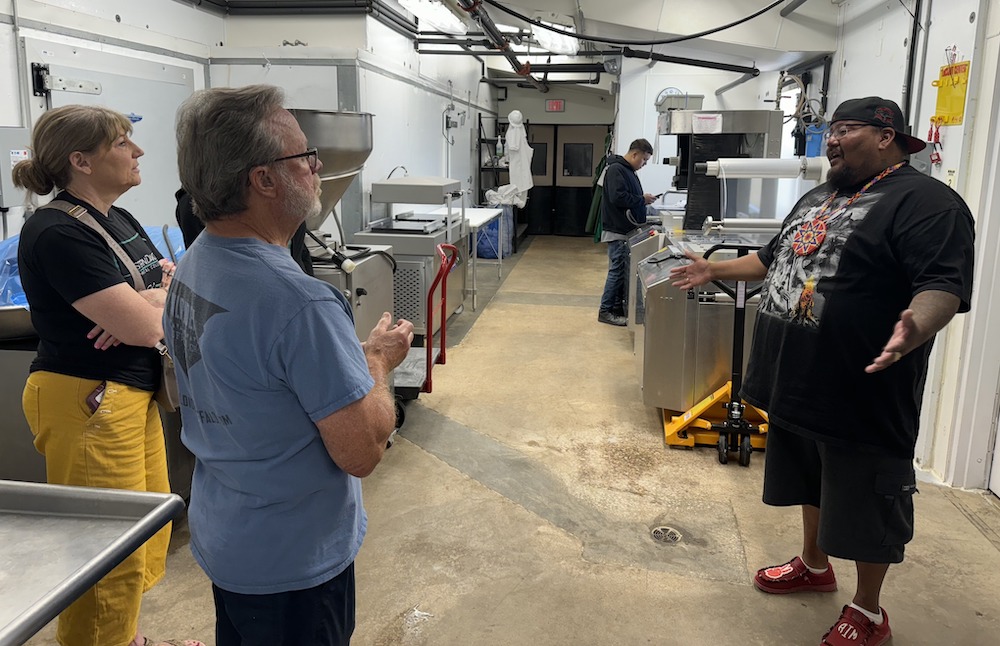
- Details
- By Chez Oxendine
- Food | Agriculture
Chris White Eagle learned meat cutting from his father, Doran, and now he’s teaching his own son the trade. But at Sacred Storm Buffalo in Rapid City, S.D., the three-generation tradition represents something much deeper than learning the family business.
“Helping my dad with cultural gatherings made me realize that kids needed a purpose. They needed an opportunity that had meaning,” White Eagle said. “This kind of work allows the people we help to heal … and dream of thriving, not just surviving.”
Sacred Storm Buffalo is a workforce development program that combines apprenticeship training in buffalo processing with cultural reconnection and, in an affiliated program, offers sober living. Young Lakota adults learn to raise, butcher and process buffalo while earning food certifications and building careers rooted in traditional foodways.
The program recently opened Sacred Storm Meats and Treats, a retail shop on Haines St. that stocks buffalo products from meat and tallow to a new line of soap made from buffalo fat, called Pretty Pink Buffalo. The market represents the latest expansion of the workforce training initiative that has grown rapidly since securing funding last year.
Some of the apprentices use the program’s “warrior lodge,” which provides a sober living environment and support for those struggling to escape addiction and abuse.
“They're finding us,” White Eagle, the program’s founder, told Tribal Business News. “They find us through our drum group, or our ceremonies, or through other people — we don't put out calls when we're hiring because they come to find us.”
The business is managed by Hódhoka Kin Holdings, a collaborative venture that unites several nonprofit organizations including the Tanka Fund, Makoce Agriculture Development and Wambli Ska Okolakiciye, a community group.
Tanka Fund Executive Director Dawn Sherman said Sacred Storm Buffalo was a "crucial step" toward returning buffalo to Native lands and lives.
"Historically, the buffalo economy was integral to our people's way of life and was unjustly taken away to subjugate and relocate our people," Sherman said. "By supporting the stewards of the land and the buffalo, we aim to restore and revitalize these opportunities, ensuring a regenerative and sustainable future for our communities.
 Chris White Eagle (right), founder of Sacred Storm Buffalo, discusses the workforce development and apprenticeship initiative with program partners in the processing facility in Rapid City, S.D. (Photo: Courtesy of Sacred Storm Buffalo)
Chris White Eagle (right), founder of Sacred Storm Buffalo, discusses the workforce development and apprenticeship initiative with program partners in the processing facility in Rapid City, S.D. (Photo: Courtesy of Sacred Storm Buffalo)
Last year, Sacred Storm Buffalo opened its training and production centers through a $1.6 million regenerative agriculture loan from NDN Collective's lending and impact investment arm, NDN Fund. The loan closed in April 2024, and enabled Sacred Storm to purchase a processing plant and harvest truck from Wild Idea Buffalo Company, as well as 50 Wind Cave heifer bison calves and 41.74 acres for a permanent ranch.
The program moved quickly, training staff and earning certification to begin meat distribution by September. Within six months, the Sacred Storm Buffalo distributed 50,000 pounds of buffalo products and established partnerships with tribes across the state for food distribution to elders and low-income families.
Kim Pate, managing director of the NDN Fund, said the program exemplifies how Indigenous-led enterprises can rapidly impact Native communities. Sacred Storm’s approach addresses food insecurity that worsened during the pandemic and also supports the cultural significance of buffalo restoration.
Pate said the program’s rapid success proves that restoring traditional food systems can address both economic and cultural needs. “Every milestone achieved is a step toward ensuring Indigenous communities in South Dakota have food sovereignty through healthy protein and economic self-sufficiency through good jobs,” she said, noting that buffalo access represents “a really important cultural value for all of our tribes.”
Economic development is important because everyone needs a good career, White Eagle said. But reconnecting to a traditional way of life is equally important.
“This is a way of life — we're teaching them a way of life,” White Eagle said. “This is a way of surviving, a way of maintaining sovereignty, and determining what success looks like for ourselves.”
Brian Edwards contributed reporting.
